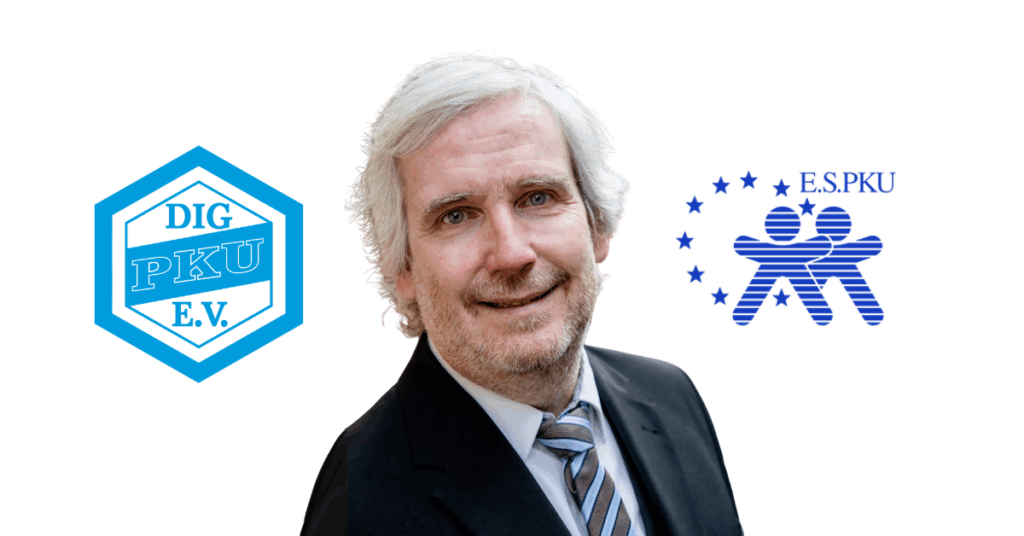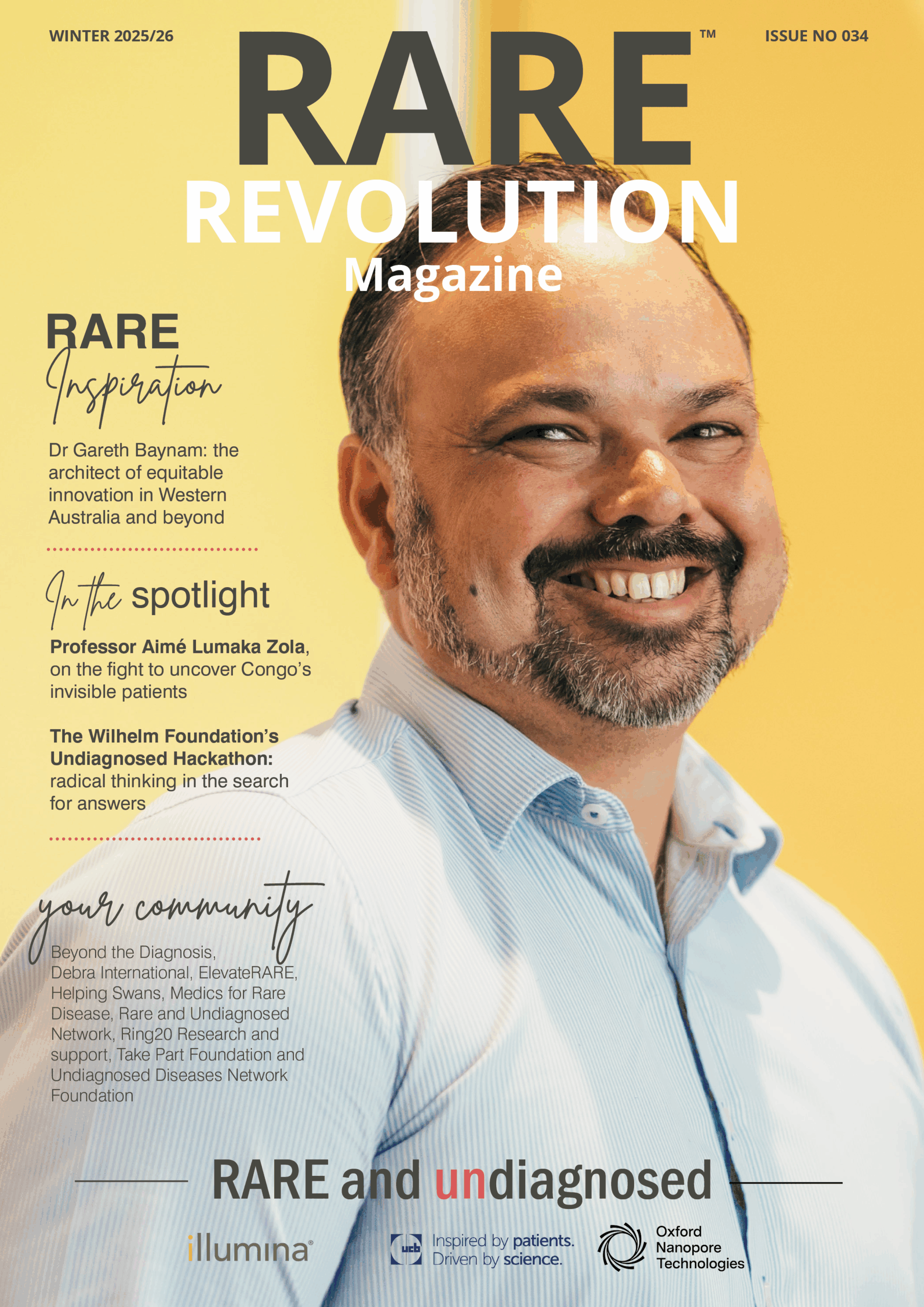Leave no one behind
Tobias Hagedorn, secretary of the European Society for Phenylketonuria (ESPKU) shares how they are challenging European legislation’s view of patient needs. By bridging policy, personal experience and scientific insight, they’re fighting to block proposed legislative changes that could redefine ‘unmet medical needs’ potentially impacting thousands and stalling research

Written by Nicola Miller
Interview with
Tobias Hagedorn, managing director of the German Phenylketonuria Patients Organisation DIG PKU and secretary of the European Society for Phenylketonuria (ESPKU)
With 95% of rare patients still having no access to effective treatments, pharmaceutical companies and patient advocates continue to push harder than ever for new therapies. To respond to this, governments aim to incentivise research and development (R&D) in areas with unmet needs such as orphan and rare diseases. There are a number of key EU regulations involved—The General Pharmaceutical Legislation (Directive 2001/83) and the Orphan Medicines Regulation from 2000. To encourage innovation, The Orphan Medicines Regulation introduced incentives like market exclusivity to spur development of rare disease treatments, which, combined with other incentives has been successful in increasing the number of orphan medicines.
Now, as these 20-year-old regulations are being reviewed, the European Commission has proposed new elements, including: 1) An obligation for pharmaceutical companies to launch products in all 27 EU markets within 2-3 years, in return for more regulatory IP protection and other incentives. 2) Introducing definitions for “unmet medical need” and “high unmet medical need”, which would provide additional incentives, for a product meeting those criteria.
Tobias Hagedorn, managing director DIG PKU and secretary of the European Society for Phenylketonuria (ESPKU) explains that these new proposals are sparking debate and concern within the rare disease community, which he sees clearly thought the lens of the phenylketonuria community.
Navigating the maze: EU legislation’s impact on the PKU community

The European Union’s legislative landscape presents various challenge for individuals affected by the rare disease phenylketonuria (PKU) with potential far-reaching consequences that extend beyond medical treatment. As Tobias explains, “EU-level regulations increasingly shape every aspect of PKU patient experiences”. At the heart of the current debate is the proposed pharmaceutical legislation, which threatens to redefine “unmet medical need” in ways that could dramatically impact PKU patients. “If the criteria to define an unmet medical need are solely based on morbidity and mortality,” Tobias warns, “it would potentially leave behind all those diseases who do have treatment, but only sub-optimal treatment that do not resolve all health issues.”
The proposed legislation represents more than a bureaucratic exercise. It could fundamentally alter how PKU is understood and supported. Currently, PKU is often mischaracterised as a “solved” paediatric healthcare problem—a misconception the ESPKU is actively challenging. “We’ve changed our wording,” Tobias explains. “Patients used to speak about a diet, we now speak about a nutritional therapy. PKU is a disease, a metabolic disease, a genetically inherited metabolic disease.”
Key legislative challenges include:
Food labelling: Regulations around low-protein food labelling directly impact patient nutrition. “If packaging would not be allowed to label the phenylalanine content,” Tobias notes, “PKU patients would not be able to identify products safe and available for them.”
Newborn Screening: Legislation affects screening implementation across different European countries. Some nations still lack comprehensive newborn screening, leaving significant populations undiagnosed.
Treatment Access: The definition of “unmet medical need” could limit access to innovative therapies, particularly for patients with late or undiagnosed conditions.
The ESPKU has developed a strategic approach to influence these discussions. By creating a cross-party alliance in the EU Parliament, they’ve secured access to policy-making processes. “We reached out to several MEPs,” Tobias explains, “making our pitch and finding allies who will examine every piece of legislation.”
The organisation’s recent white paper represents a critical tool in this advocacy. By bringing together researchers, clinicians, and patient representatives, they’ve created a comprehensive document highlighting the diverse unmet needs in PKU care. “We need to explain that PKU is not just a diet,” Tobias emphasises. “We must tell our stories in a way that is emotional, but not over-emotional, and factual to demonstrate the true impact.”
The stakes are high. With an estimated 70,000 people living with PKU across Europe, legislative decisions have profound human implications. These are not abstract policy discussions, but decisions that directly impact daily lives, mental health, and long-term patient outcomes. As EU legislation continues to evolve, the ESPKU remains committed to ensuring that PKU patients are considered in this. Their work represents a critical bridge between policy-making and patient experience, transforming bureaucratic language into meaningful support.
The innovation crossroads: balancing incentives and access

In rare disease research and development, the delicate balance of incentives represents a critical challenge. Tobias offers a nuanced perspective on the risks of diminishing innovation support. “If we reduce the incentives away from diseases like PKU,” he warns, “research and development would potentially become impossible being no longer ‘affordable’ for industries.” This concern strikes at the heart of a complex debate about how to sustainably support medical innovation for rare conditions.
The European Commission’s current approach threatens to create an “either/or policy, rather than an as well as policy,” potentially narrowing the focus of medical research. Tobias highlights the danger of extreme positions, noting that while some argue orphan drugs are too expensive, simply removing incentives is equally problematic. “Most extreme positions are as right as they are wrong,” he explains. “They give a short-shed light on an issue that exists, but they are just looking at the extremes.” The real challenge lies in finding a middle ground that supports both innovation and accessibility. For PKU patients, this means developing therapies that go beyond traditional understanding. An innovative treatment might not change life expectancy or immediate morbidity but could significantly reduce the burden of therapy and address critical mental health challenges. “Just because there is potentially a new drug that doesn’t change our life expectancy,” Tobias notes, “the burden of therapy and mental health issues remain no less critical for consideration.”
The risk of removing incentives extends beyond immediate research. It threatens the entire ecosystem of rare disease innovation, potentially leaving patients with limited hope for improved treatments. For PKU, this could mean maintaining a status quo that fails to address the complex, lifelong challenges patients face. Tobias emphasises the need for a balanced approach: “We need to figure out what is the best solution allowing for development of affordable orphan drugs, because we need them—not only us, but also the 95% of diseases who do not have anything.” Without appropriate incentives, rare disease research could stall, leaving millions of patients without hope for improved treatments.
Delicate negotiation is required—advocating for innovation while ensuring accessibility and patient-centred care. “We do not bother about their shareholder value,” Tobias stresses. “We bother about access to the best possible treatments and scientific progress.” But Tobias recognised the need to protect both patient needs and the scientific ecosystem that serves them.
Your voice matters: getting involved in the EU legislation debate

The window of opportunity for influencing EU pharmaceutical legislation is narrowing but advocates still have crucial chances to make their voices heard. As Tobias explains, the current timeline presents critical moments for engagement. “The EU Presidency is pushing to finalise discussions quickly but there remain ways to get involved in this important debate.”
National advocacy: “Our member organisations have a critical opportunity to advocate on the national level,” Tobias emphasises. The council represents national health policy bodies, making local engagement crucial.
Targeted Approaches:
- contact your national health policy representatives
- engage with your local patient advocacy groups
- prepare concise, fact-based presentations about unmet medical needs
- highlight specific impacts on patient communities
Key focus areas or your disease area:
- challenge narrow definitions of unmet medical needs
- emphasise quality of life beyond morbidity and mortality
- share personal stories with factual backing
“The window of opportunity is closing down,” Tobias cautions. “The longer we take, the narrower it becomes.”
For Tobias, he encourages the wider rare disease community to engage in the following practical next steps: monitor EU legislative discussions, join patient advocacy networks, attend informational sessions and support organisations like ESPKU in their advocacy efforts.
“This is the moment to approach policy makers and alert them about concerns regarding unmet medical needs,” Tobias advises. “If we do not use this chance, we cannot blame the system later.” The message is clear: patient voices are not just welcome, but essential in shaping healthcare legislation that impacts millions of lives.
The PKU community’s journey represents more than an isolated narrative—it emerges as a united voice for systemic change. “PKU can serve as an example for potentially many more diseases,” Tobias explains, highlighting the broader implications of their advocacy work. The challenges faced by PKU advocates—navigating complex legislation, challenging narrow medical definitions, and fighting for comprehensive patient understanding—mirror the struggles of numerous rare disease communities. Their strategic approach of combining emotional storytelling with rigorous factual evidence offers a template for effective advocacy across rare disease landscapes. By pushing for a more nuanced understanding of “unmet medical needs” that extends beyond traditional metrics of morbidity and mortality, ESPKU is creating pathways for other rare disease groups to articulate their complex, multifaceted experiences.
Their work demonstrates that true healthcare innovation requires listening to patient voices, understanding individual experiences, and recognising that medical progress is not just about treating symptoms, but improving quality of life. “We are the go-between,” Tobias notes, “not super rare, but not common.” This positioning allows the PKU community to bridge critical gaps, serving as a model for how rare disease groups can collectively amplify their voices, challenge systemic limitations, and drive meaningful change.
The implications of these legislative changes extend far beyond PKU, making now the time to have your voice hear on the matter.
To find out more on how to join this important debate please visit:
https://www.facebook.com/ESPKU
Definitions and source
In the proposed Directive the definition of UMN is:
Article 83 Medicinal products addressing an unmet medical need 1. 2. 3. 1. 2. 3. EN A medicinal product shall be considered as addressing an unmet medical need if at least one of its therapeutic indications relates to a life threatening or severely debilitating disease and the following conditions are met: (a) (b) there is no medicinal product authorised in the Union for such disease, or, where despite medicinal products being authorised for such disease in the Union, the disease is associated with a remaining high morbidity or mortality; the use of the medicinal product results in a meaningful reduction in disease morbidity or mortality for the relevant patient population. Designated orphan medicinal products referred to in Article 67 of [revised Regulation (EC) No 726/2004] shall be considered as addressing an unmet medical need. Where the Agency adopts scientific guidelines for the application of this Article it shall consult the Commission and the authorities or bodies referred to in Article 162 of [revised Regulation (EC) No 726/2004].
In the proposed Regulation the definition of High UMN need is as follows:
Article 70 Orphan medicinal products addressing a high unmet medical need An orphan medicinal product shall be considered as addressing a high unmet medical need where it fulfils the following requirements: EN 86 (a) there is no medicinal product authorised in the Union for such condition or where, despite medicinal products being authorised for such condition in the Union, the applicant demonstrates that the orphan medicinal product, in addition to having a significant benefit, will bring exceptional therapeutic advancement; (b) 2. the use of the orphan medicinal product results in a meaningful reduction in disease morbidity or mortality for the relevant patient population.


